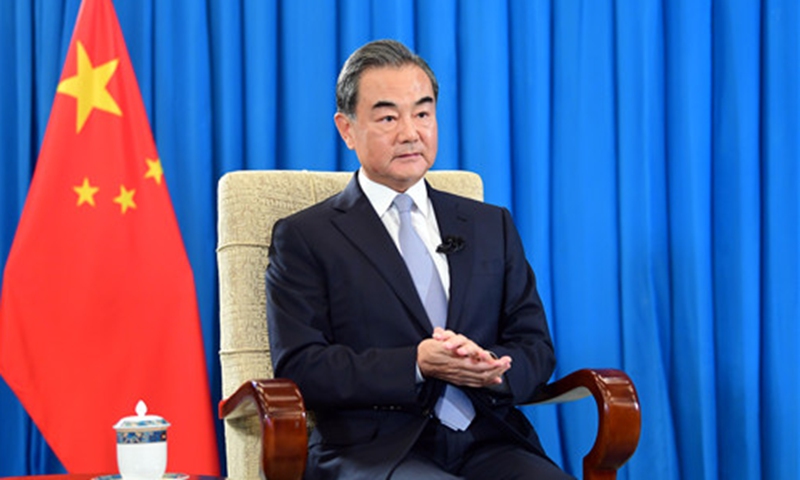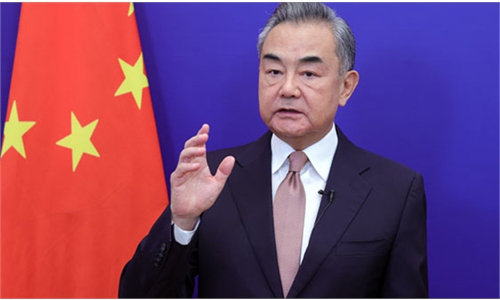
State Councilor and Foreign Minister Wang Yi
As world leaders, especially the heads of state of "drowning" island nations, sit together to face one of the most persistent and pressing issues - climate change - at the UN General Assembly, the US once again played up its political game with its latest ratification of a climate treaty, pointing fingers at China while ignoring its own duties both as the largest cumulative emitter of greenhouse gases and a major world power that is obliged to help developing countries achieve their emission reduction goals.
In contrast to the US' irresponsible moves, China has been making steady progress toward its carbon peak and carbon neutrality targets, Chinese diplomats said, while urging developed countries, including the US, to fulfill their commitments and achieve carbon neutrality.
During a private meeting of Heads of State and Government held on Wednesday at the UN Headquarters in New York, UN Secretary-General Antonio Guterres called for more action and leadership to tackle the climate crisis, warning that efforts to keep the rise in global temperatures to 1.5 degrees above pre-industrial levels is "on life support."
In his address to the meeting, Chinese State Councilor and Foreign Minister Wang Yi made a four-point proposal, stressing that countries should not abandon efforts in energy restructuring because of COVID-19 or the energy crisis, and should follow the principle of common but differentiated responsibilities, taking action to meet the temperature control targets set by the Paris Agreement with greater speed.
Wang called on all sides to give up their unilateral stance and geopolitical wrestling in tackling global challenges, adding that developed countries should achieve carbon neutrality in advance, making room for developing countries and rebuilding trust.
Developed countries should fulfill their commitments and provide financial, technological and capacity-building support to developing countries, Wang added.
In recent weeks, the record heat waves along with an energy crisis partly caused by the US-instigated Russia-Ukraine crisis have forced some European countries to row back on their climate goals. Meanwhile, in the US, one of the world's biggest emitters, tackling climate change has descended into a partisan struggle.
The US Senate approved the ratification of a climate treaty amendment known as the Kigali amendment to the Montreal Protocol treaty of 1987, which would reduce the production and use of man-made hydrofluorocarbons, or HFCs, used in air conditioners and other appliances, which scientists say warm the planet when released into the air.
However, the measure passed with a last-minute requirement: a provision that compels US State Department officials to propose to the UN that it end China's status as a developing nation, "a status that gives the country, a major HFC producer, more time to comply with phasing down usage," the Wall Street Journal reported.
Wang Yuanfeng, director of the Carbon Neutrality Technology and Strategy Research Center at Beijing Jiaotong University, told the Global Times that China adheres to the principle of common but differentiated responsibilities in addressing climate change, while urging the US to face up to the fact that it is the largest cumulative emitter of greenhouse gases and should take up its responsibilities more actively.
"Being the largest cumulative emitter of greenhouse gases, the US has accounted for about 25 percent of cumulative global CO2 emissions so far, with China accounting for only 13 percent," the expert noted.
Meanwhile, the US has done poorly in tackling climate change in recent years, withdrawing from the Kyoto Protocol and the Paris Agreement and failing to deliver its funding promise in climate aid at the 2009 Copenhagen conference.
Also on Wednesday, China's climate envoy Xie Zhenhua held a video conference with his German counterpart Jennifer Morgan. Xie said global climate governance faces multiple challenges and uncertainties, and some European countries have been moving backward in their climate policies.
Xie hoped that all countries will take positive measures to implement mid- and long-term climate change targets. Developed countries are expected to fulfill their commitment of providing at least $100 billion a year to developing countries to enhance mutual trust in fighting climate change.

